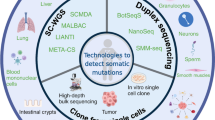Abstract.
Werner syndrome (WS) is a rare autosomal recessive disorder characterized by genomic instability and by the premature onset of a number of age-related diseases, including cancers. The gene responsible for WS encodes a protein that has an exonuclease domain and a domain similar to DNA helicases of the RecQ-like subfamily. Accumulating evidence indicates that the WS gene product is involved in resolving aberrant DNA structures that may arise during the process of DNA replication and transcription. Such processes generate regions of single-stranded DNA that may inadvertently provide a substrate for the initiation of recombination. Various mechanisms have evolved to ensure that recombination does not occur promiscuously during these events, and results are consistent with a model in which the WS protein is part of one such mechanism.
Similar content being viewed by others
Author information
Authors and Affiliations
Additional information
Received 13 October 2000; received after revision 6 December 2000; accepted 6 December 2000
Rights and permissions
About this article
Cite this article
Lebel, M. Human Genome and Diseases: A new series of reviews in CMLS¶Werner Syndrome: genetic and molecular basis of a premature aging disorder. CMLS, Cell. Mol. Life Sci. 58, 857–867 (2001). https://doi.org/10.1007/s00018-001-8398-y
Issue Date:
DOI: https://doi.org/10.1007/s00018-001-8398-y




